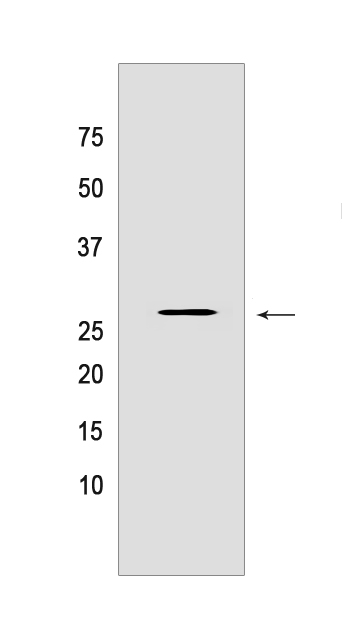HPGD Mouse mAb[Z7UF]Cat NO.: A52184
Western blot(SDS PAGE) analysis of extracts from COLO 320 cells.Using HPGD Mouse mAb IgG [Z7UF] at dilution of 1:1000 incubated at 4℃ over night.
Product information
Protein names :HPGD,PGDH1,SDR36C1,PGDH_HUMAN,15-hydroxyprostaglandin dehydrogenase [NAD] ])
UniProtID :P15428
MASS(da) :28,977
MW(kDa) :28kda
Form :Liquid
Purification :Protein A purification
Host :Mouse
Isotype :IgG
sensitivity :Endogenous
Reactivity :Human
- ApplicationDilution
- 免疫印迹(WB)1:1000-2000
- 免疫组化(IHC)1:100
- 免疫荧光(ICC/IF) 1:100,
- The optimal dilutions should be determined by the end user
Specificity :Antibody is produced by immunizing animals with a synthetic peptide of human HPGD.
Storage :Antibody store in 10 mM PBS, 0.5mg/ml BSA, 50% glycerol. Shipped at 4°C. Store at-20°C or -80°C. Products are valid for one natural year of receipt.Avoid repeated freeze / thaw cycles.
WB Positive detected :COLO 320 cells
Function : Catalyzes the NAD-dependent dehydrogenation (oxidation) of a broad array of hydroxylated polyunsaturated fatty acids (mainly eicosanoids and docosanoids, including prostaglandins, lipoxins and resolvins), yielding their corresponding keto (oxo) metabolites (PubMed:8086429, PubMed:10837478, PubMed:16828555, PubMed:16757471, PubMed:21916491, PubMed:25586183). Decreases the levels of the pro-proliferative prostaglandins such as prostaglandin E2 (whose activity is increased in cancer because of an increase in the expression of cyclooxygenase 2) and generates oxo-fatty acid products that can profoundly influence cell function by abrogating pro-inflammatory cytokine expression (PubMed:25586183, PubMed:15574495). Converts resolvins E1, D1 and D2 to their oxo products, which represents a mode of resolvin inactivation. Resolvin E1 plays important roles during the resolution phase of acute inflammation, while resolvins D1 and D2 have a unique role in obesity-induced adipose inflammation (PubMed:16757471, PubMed:22844113)..
Tissue specificity :Detected in colon epithelium (at protein level)..
Subcellular locationi :Cytoplasm.
IMPORTANT: For western blots, incubate membrane with diluted primary antibody in 1% w/v BSA, 1X TBST at 4°C overnight.


